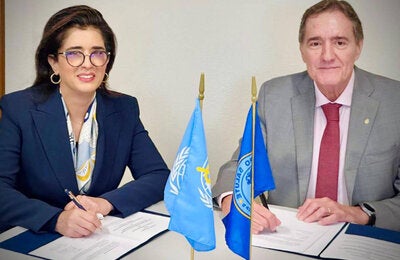
PAHO Director Jarbas Barbosa met with representatives from countries in the Americas to offer support during negotiations of new instrument for better pandemic preparedness and response.
Geneva, Switzerland, 7 February 2023 (PAHO/WHO) - Implementing the lessons from COVID-19, including through a new international health instrument, and recovering gains on immunization, communicable and non-communicable diseases were some of the key topics discussed at the 152nd World Health Organization (WHO) Executive Board this past week.
The Director of the Pan American Health Organization (PAHO), Jarbas Barbosa, participated in the discussions following his appointment as WHO Regional Director for the Americas. He also met representatives from Latin America and Caribbean countries to discuss priority issues, including stronger participation of countries of the region in the intergovernmental negotiating body (INB) for the pandemic treaty, set to be tabled for approval of Member States at the World Health Assembly in 2024.
"Countries in our region must take advantage of the ongoing negotiations for the new instrument, as this unique opportunity may not happen again so soon,” Dr. Barbosa reiterated in a meeting with the Permanent Representative of Mexico to the United Nations in Geneva, H.E. Ms. Francisca Elizabeth Mendez Escobar.
“One of my priorities is to share information with countries in a systematic way to clarify technical, legal and financial implications of any new instrument,” he added.
During the bilateral meeting, Ambassador Mendez also highlighted the importance of a regional approach to input into the process, as Latin America and the Caribbean countries have "similar problems, and if go as a group, are more relevant."
They also discussed other topics, such as PAHO’s support to the country’s advancing transformation towards universal health and strengthened collaboration to tap into Mexico’s technical expertise in areas such as surveillance, which can help other countries in the region.
The new PAHO Director also met with the Minister of Public Health and Social Welfare of Paraguay, Dr. Julio Cesar Borba Vargas, where they discussed several issues, including how to optimize PAHO's technical resources and cooperation mechanisms.
The Minister highlighted the challenge his country faces in acquiring high-cost medicines, such as those to treat rare diseases, which can cost up to 2 million USD. Dr. Barbosa said Paraguay can count on PAHO's support to seek alternatives to purchase such medicines, for example through the organization’s Strategic Fund.
Support to health infrastructure, treatment of chronic diseases and combating an unprecedented dengue outbreak were main topics of the PAHO Director's meeting with Suriname's Minister of Health, His Excellency Amar Ramadhin.
The Minister thanked PAHO for the assistance during the recent floods and asked for support to tackle the current outbreak of dengue. "We are experiencing spikes in cases that we have never seen before," Dr. Ramadhin said. He also highlighted the burden of kidney disease in the country and sought PAHO support in initiatives to promote behavioral change.
Dr. Barbosa vowed to provide support, including supplies, to Suriname to tackle dengue, and technical assistance for the management of non-communicable diseases. He also commended Suriname’s advances towards the elimination of malaria.
Discussions during a meeting with Colombia’s Vice Minister of Public Health and Provision of Services, Dr. Jaime Hernan Urrego Rodriguez and the PAHO director centered around the country’s health reform, which aims to address gaps in services to vulnerable or remote populations.
“We have universal coverage and comply with the principles of the Astana Declaration, however access to health is not equitable in the country,” Vice Minister Hernan Urrego Rodriguez said.
A PAHO mission has been dispatched to Colombia this week to provide technical advice during the national discussions to improve health systems. Dr. Barbosa in addition reiterated PAHO’s support to Colombia to strengthen primary care to reduce preventable deaths, such as those caused by non-communicable diseases, and to improve maternal health.
The PAHO Director also met with H.E. Dr. Carlos Aguilar, Permanent Representative of Honduras to the United Nations in Geneva. Discussions focused on stronger representation of smaller countries in international health-related processes, such as the negotiations for the pandemic treaty, but also in the governance of health organizations.
Ambassador Aguilar and Dr. Barbosa also discussed PAHO support to increase the availability of oxygen for home use in Honduras, needed in the management of conditions such as emphysema. They also discussed other issues such as mental health. Dr. Barbosa said the PAHO High Level Commission on Mental Health is due to release its first report this spring, with recommendations to countries on how to strengthen services to prevent and treat mental health conditions.
During the week, Dr. Barbosa also participated in a meeting with the Group of Member States of the Americas (GRUA), where he shared the five priorities of his incoming tenure.
The WHO Executive Board is composed of 34 technically qualified members elected for three-year terms. The main functions of the Board are to implement the decisions and policies of the Health Assembly, and to advise and facilitate its work. The current Board counts with six member states from the Americas: Brazil, Canada, Colombia, Paraguay, Peru and the United States.



